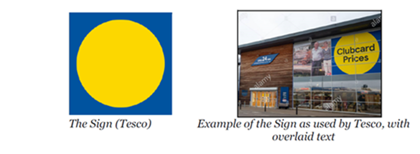

Is it now all in the bag for Lidl, or is there still anything in the legal shopping trolley for Tesco?
The battle of the supermarkets may continue…
In the third, and what could potentially be the final, instalment of our series of articles in relation to this long running four-year dispute between Lidl and Tesco, the Court of Appeal (CoA) have recently upheld, with some undisguised reluctance, that the first instance judge’s (Mrs Justice Joanna Smith’s) findings of fact, whilst incorrect in their respective view, was not “rationally insupportable”. The CoA therefore found that Tesco’s use of the blue square and yellow circle price signifier in its Clubcard Prices logo did constitute trade mark infringement and passing off.
However, the CoA did uphold Tesco’s appeal that it did not infringe copyright in Lidl’s logo as Tesco had not utilised enough of it for it to warrant a substantial part.
The CoA also dismissed Lidl’s appeal in relation to the validity of its registered wordless trade mark, concluding that the trade mark had been registered in bad faith.
A Reminder of the Trade Marks in Issue


The CoA made it clear that the judges’ of first instance findings of fact were “surprising” and, as Lewison LJ further articulated, “…at the outer boundaries of trade mark protection and passing off…” and doubted whether he himself would have come to the same conclusion. That said, the CoA acknowledged that was not the question on appeal, but rather whether the trial judges’ findings of fact were rationally insupportable. They were not.
Unfortunately for Tesco, despite its efforts to seemingly differentiate its Clubcard Prices logo from Lidl’s logo to promote its own distinctive price saving brand, it failed. As a result, Tesco will now need to eradicate its infringing Clubcard Prices logo from all its stores and products, (at a cost which Tesco have previously indicated could exceed £7 million) and rebrand its Clubcard price signifier.
While the CoA would not have come to the same factual conclusions as the first instance judge, that was not the test to be applied on appeal and it was not up to the CoA to simply substitute its own evaluation of the facts, however “surprising” they found them to be. The CoA acknowledged that the judge at first instance did apply the law of trade mark infringement and passing off correctly and therefore Tesco’s appeal, in the main, had to be dismissed.
As outlined in our second instalment and previous article, given the CoA’s decision, it will remain to be seen how and what approach the judge at first instance now adopts in quantifying Lidl’s losses and damages for breach of trade mark and passing off. That figure is, however, likely to be substantial.
The CoA’s decision proves just how difficult it is, in reality, to overturn a first instance decision finding on the facts.
As the dispute demonstrates, the stakes are very high if you get involved in adopting a marketing strategy that may have been “inspired” by those of your competitors. If you do you may find yourself going round in legal (yellow) circles on a blue background of escalating costs and litigation angst!
Contact our team of leading commercial litigation solicitors for expert advice in relation to all aspects of commercial litigation and commercial dispute resolution.
More articles by Dominic Green






